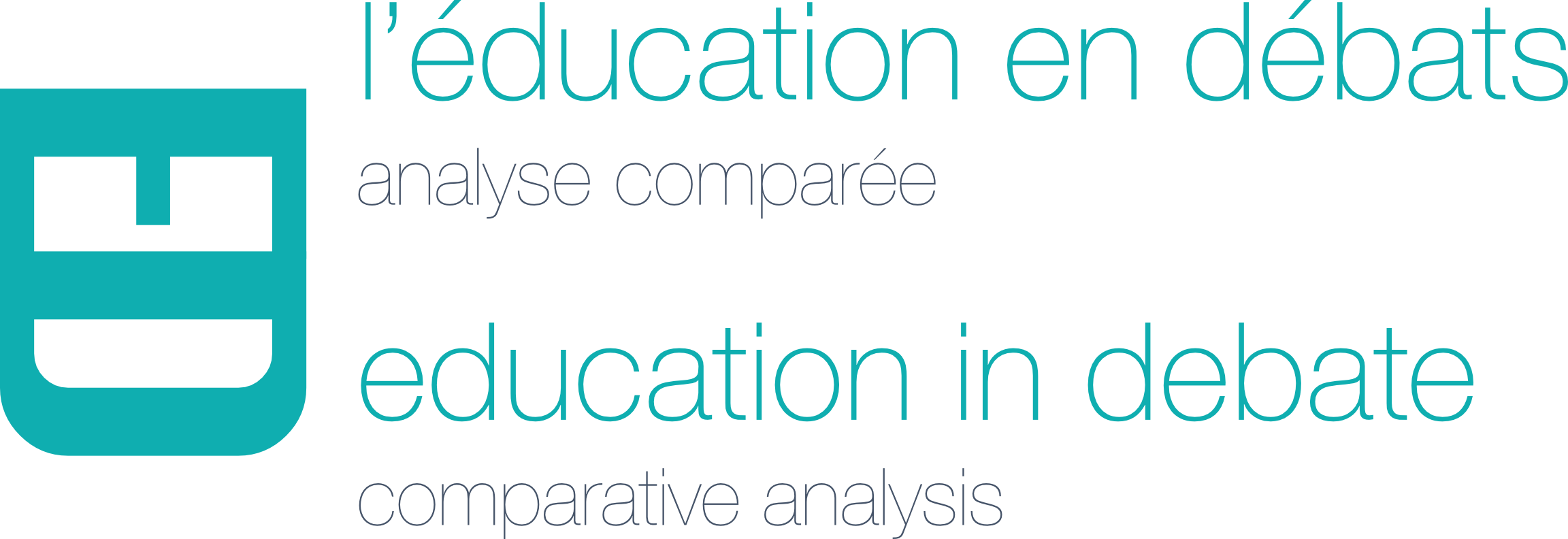L’éducation au service du développement. La vision de la Banque mondiale, de l’OCDE et de l’UNESCO
Abstract
This article analyzes the links between education and development from the perspective of major international organizations in the worldwide education sector: the World Bank, the OECD and UNESCO. After presenting the context of our research that focalizes on the major characteristics of the three organizations and the methodology, we will focus on these institution’s perception of the conception of development. Next, we will highlight the implications of these development visions for education systems. In conclusion, while analyzing the recent evolutions in the discourses of international organizations, we will discuss the need to go beyond a narrow vision of development and therefore of education.
References
Adams, D., Acedo, C. & Popa, S. (2012). In search of quality education. In C. Acedo, D. Adams & S. Popa (Ed.), Quality and Qualities Tensions in Education Reforms. Rotterdam: SensePublishers.
Arnove, R. F., Torres, C. A. & Franz, S. (2012). Comparative Education: The Dialectic of the Global and the Local. Lanham, MD: Rowman & Littlefield.
Barrón Pastor, J. C. (2015). Post-Development Theory: What is Education for? In T. McCowan & E. Unterhalter (Ed.), Education and International Development (pp. 69–78). London: Bloomsbury Publishing.
Banque mondiale. (1995). Priorités et stratégies pour l’éducation. Une étude de la Banque mondiale. Washington, DC: Banque mondiale.
Klees, S. J., Samoff, J. & Stromquist, N. P. (2012). The World Bank and Education: Critiques and Alternatives. Rotterdam: Sense Publishers.
Lauwerier, T. (2017). Editorial. Quel développement pour quelle éducation ? La vision des organisation internationales. Education en débats: analyse comparée, 8, 1-4.
Lauwerier, T. (2013, August). L’influence de la Banque mondiale sur les politiques nationales d’éducation de base en Afrique de l’Ouest francophone. Université de Genève, FAPSE, Genève.
Malet, R. (2011). Les organisations internationales. In P. Rayou & A. van Zanten (Ed.), Les 100 mots de l’éducation (p. 100). Paris: PUF.
McCowan, T. (2015). Theories of Development. In T. McCowan & E. Unterhalter (Ed.), Education and International Development (pp. 31-48). London: Bloomsbury Publishing.
Morin, E. (2011). La Voie. Pour l’avenir de l’humanité. Paris: Fayard.
Mundy, K., Green, A., Lingard, B. & Verger, A. (2016). Handbook of Global Education Policy. Chichester, West Sussex: Wiley Blackwell.
OCDE (1997). Analyse des politiques d’éducation. Paris: OCDE.
OCDE (2005). Analyse des politiques d’éducation. Paris: OCDE.
OCDE (2013). L’éducation aujourd’hui. La perspective de l’OCDE. Paris: OCDE
Rizvi, F. & Lingard, B. (2009). The OECD and Global Shifts in Education Policy. In R. Cowen & A. M. Kazamias (Ed.), International Handbook of Comparative Education (pp. 437-453). Dordrecht: Springer Netherlands.
Psacharopoulos, G. (1996). Designing educational policy: A mini-primer on values, theories and tools. International Journal of Educational Development, 16(3), 277-279.
Rist, G. (2010). L’économie ordinaire entre songes et mensonges. Paris: Presses de Sciences Po.
Robert, A., & Bouillaguet, A. (2007). L’analyse de contenu. Paris: PUF.
Robertson, S. L., Novelli, M., Dale, R., Tikly, L., Dachi, H. A. & Alphonce, N. (2007). Globalisation, Education and Development: Ideas, Actors and Dynamics. Bristol: University of Bristol.
Stein, H. (2004). The World Bank and the IMF in Africa: Strategy and Routine in the Generation of a Failed Agenda. Ann Arbor, MI: University of Michigan.
UNESCO. (1996). Stratégie à moyen terme 1996-2001. Paris: UNESCO.
UNESCO. (2002). Stratégie à moyen terme 2002-2007. Paris: UNESCO.
UNESCO. (2014). Stratégie de l’UNESCO pour l’éducation 2014-2021. Paris: UNESCO.
UNESCO. (2015). Repenser l’Education. Vers un bien commun mondial? Paris: UNESCO.
Unterhalter, E. (2015). Education and International Development: A History of the Field. In T. McCowan & E. Unterhalter (Ed.), Education and International Development (pp. 13–29). London: Bloomsbury Publishing.
World Bank. (2005). Education Sector Strategy. Achieving Education for All, Broadening our Perspective, Maximizing our Effectiveness. Washington, DC: World Bank.
World Bank. (2011). Learning for All. Investment in People’s Knowledge and Skills to Promote Development. Washington, DC: World Bank.
Downloads
Published
How to Cite
Issue
Section
License
Some rights reserved 2021 The Author(s)

This work is licensed under a Creative Commons Attribution-NonCommercial-NoDerivatives 4.0 International License.




